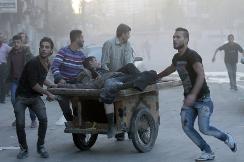Powerful armed groups in Syria said attending peace talks or negotiating with the regime would be an act of "treason," as fighting raged on Sunday near Iraq and in Homs.

Two injured men are transported on a fruit barrow in the Syrian city of Aleppo, following shelling as fighting between pro-government forces and rebels continues on October 26, 2013
An international watchdog meanwhile said Syrian President Bashar al-Assad's regime handed over on time a detailed plan on destroying its chemical weapons stockpile.
The move was in line with a US-Russian deal reached last month that headed off threatened military strikes on Syria and added momentum to an initiative for peace talks to be staged in Geneva next month.
But the initiative's backers have struggled to win the support of the warring parties in Syria, where more than 115,000 people are estimated to have been killed in the 31-month conflict.
In the latest blow, 19 Islamist groups fighting to topple Assad issued a statement saying the so-called Geneva 2 conference "is not, nor will it ever be our people's choice or our revolution's demand."
"We consider it just another part of the conspiracy to throw our revolution off track and to abort it," said the statement read out by Suqur al-Sham brigade chief Ahmad Eissa al-Sheikh in a video posted online.
They went on to say that anyone who attends such talks would be committing "treason" and "would have to answer for it before our courts."
The statement comes as the UN-Arab League peace envoy to Syria, Lakhdar Brahimi, prepares to travel to Damascus on Monday as part of a regional tour, a Syrian government source told AFP.
On Sunday President Hassan Rouhani of Iran, a key ally of Damascus, told Brahimi the solution to the crisis was to expel "terrorist groups" from the country, the term applied by the Syrian regime to all the rebel groups struggling to overthrow it.
Rouhani also called for continuing humanitarian aid and for the "complete destruction of chemical weapons," saying Tehran is ready to play a "positive role in any movement that would contribute to stability in Syria," the official IRNA news agency reported.
Under pressure from its Western backers to attend, the National Coalition opposition group is to meet on November 9 to decide whether to take part in the peace conference.
But it has insisted it will only do so if there are guarantees Assad will step down, and its leader Ahmad Jarba has also said no talks can take place unless the regime frees women and children from its jails.
Assad has said "the factors are not yet in place" for such talks, and has repeatedly rejected negotiations with any group tied to the rebels or to foreign states.
Chemical plan submitted
In a separate development, the Organisation for the Prohibition of Chemical Weapons said Sunday that Damascus had handed over a detailed plan to destroy its chemical stockpile three days earlier.
Damascus was required to submit the plan by Sunday under a UN Security Council resolution that also called for a political settlement to end the war.
On Syria's eastern frontier with Iraq, Kurdish militiamen took over most of the town of Yaarubiyeh a day after they routed jihadists from the border post, said the Syrian Observatory for Human Rights.
By Sunday, the Kurds had "near-total control" over the town, said the group, adding that fighting was still raging in the south of Yaarubiyeh.
The Islamic State of Iraq and the Levant (ISIL), an Al-Qaeda front group fighting the Kurds there, called on other jihadists to join the battle, said the Observatory.
The opposition Coalition has said Iraq "continues to interfere with Syria's internal affairs," and that its troops had "shelled" the Yaarubiyeh border post in cooperation with the Kurdish fighters.
But the Britain-based Observatory, which relies on a large network of activists and other witnesses across Syria, said the allegations were unfounded.
In the central province of Homs, rebels battled regime troops in a bid to capture major weapons depots.
One of the battlegrounds is Sadad, a Christian town in the province where shelling killed two men and three women from the same family.
The Assyrian Human Rights Network has called for a ceasefire in Sadad, "even if just for a few hours, to evacuate the killed and wounded civilians, and to bring in medicines, water and other humanitarian supplies to the civilians trapped in their homes since last Monday."